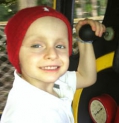Development of MicroRNA-Nanoparticles to Treat Childhood Acute Leukemia Carrying MLL Rearrangements
Background
Approximately 10-20% of childhood acute leukemias, including ~80% of those in infants, involve the mixed lineage leukemia (MLL) gene rearrangements that are associated with poor prognosis (only ~40% survival rate). Therefore, it is urgent to develop a new therapy with high efficacy and minimal side effects.
MicroRNAs are a class of small non-coding RNAs that play critical roles in gene regulation. Recently, we have found that patients with MLL-rearranged leukemias exhibit significantly low expression of microRNA-150 (miR-150) that normally functions as a critical suppressor of tumor growth through targeting essential oncogenes including FLT3.
Project Goal
In this project, we hypothesize that, restoration of the expression/function of miR-150 is a highly promising therapeutic strategy to effectively treat childhood MLL-rearranged leukemias. To achieve highly specific delivery of miR-150 to diseased cells, FLT3L-directed nanoparticles will be developed. Note that FLT3, a direct target gene of miR-150, encodes a class III receptor tyrosine kinase whose overexpression and constitutive activation is a common feature of MLL-associated leukemias, offering an ideal target to be specifically bound by its ligand (i.e., FLT3L).
Our preliminary studies show that the FLT3L-targeted nanoparticle system containing miR-150 selectively and efficiently targets and kills MLL-rearranged leukemic cells in vitro. The proposed study herein will focus on in-vivo validation of this targeted system using humanized mouse models that represent childhood MLL-rearranged leukemias. Upon successful completion of this study, we will have developed an in-vivo proven targeted nanoparticle system that can be potentially translated into clinics to directly help children suffering from the presently therapy-resistant diseases.

